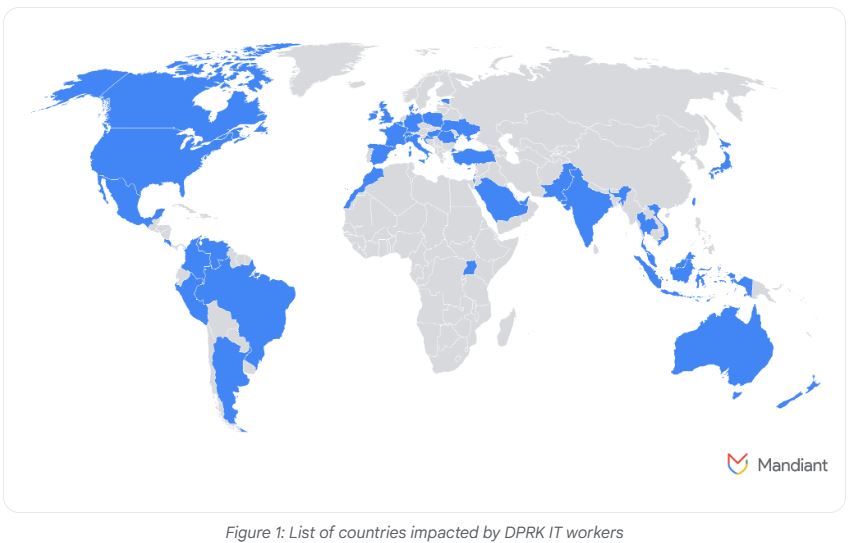Recent revelations from Google’s Threat Intelligence Group (GTIG) have shed light on the alarming trend of North Korean tech workers infiltrating blockchain and cryptocurrency firms outside the United States. As U.S. authorities enhance their scrutiny and raise awareness around these security threats, many of these fraudulent workers are now turning their sights to countries such as the UK and across Europe. This shift suggests a growing global network designed to bolster their operations, a move that many experts are taking seriously.
“In response to heightened awareness of the threat within the United States, they’ve established a global ecosystem of fraudulent personas to enhance operational agility,” said Jamie Collier, an adviser at GTIG.
According to Collier’s report, these North Korean individuals are not only dabbling in conventional tech roles but are also engaging with advanced blockchain initiatives, including projects based on technologies like Solana and smart contract development with Anchor. In a striking example, a blockchain job marketplace and an artificial intelligence application leveraging blockchain features have reportedly been infiltrated as well.
“These individuals pose as legitimate remote workers to infiltrate companies and generate revenue for the regime,” Collier cautioned, highlighting the dangers organizations face when hiring these reportedly fraudulent IT professionals.
The investigation uncovered that some North Korean workers were using an array of aliases and resumes linked to various European institutions, with activities reported in countries such as Germany, Portugal, and even Serbia. This savvy maneuvering indicates a strategic pivot as pressure mounts within the U.S. job market.
Furthermore, there has been an uptick in extortion attempts linked to these workers, with former employees reportedly threatening to disclose sensitive company data unless paid. This trend coincides with a notable crackdown by U.S. authorities, including recent indictments against North Korean nationals accused of running fraudulent IT schemes affecting numerous U.S. companies over several years.
“This places organizations that hire DPRK [Democratic People’s Republic of Korea] IT workers at risk of espionage, data theft, and disruption,” Collier noted.
As the crypto landscape continues to evolve, the implications of these findings are profound. Founders within the crypto community are voicing increased concerns over sophisticated hacking attempts attributed to North Korean actors, reporting unsettling experiences during virtual meetings where hackers attempted to extract sensitive information under the guise of legitimate business interactions.
With the urgency for vigilance growing stronger, the industry now finds itself navigating a perilous situation where the intersection of technology, international relations, and cybersecurity becomes increasingly complex.
Fraudulent North Korean Tech Workers Target Crypto Firms
The infiltration of North Korean tech workers into blockchain companies outside the U.S. poses significant risks to organizations and individuals involved in the tech industry. Here are the key points about this growing threat:
- Expansion of Operations:
- North Korean tech workers are increasingly targeting blockchain companies in Europe due to heightened scrutiny in the U.S.
- These operatives have infiltrated projects involving advanced blockchain applications, including Solana and smart contracts.
- Formation of a Global Network:
- Fraudulent personas are being established to enhance operational flexibility for North Korean IT workers.
- Facilitators in the UK and across Europe support the expansion of this global infrastructure.
- Risk of Espionage and Data Theft:
- Hiring North Korean IT workers leads to heightened risks of espionage, data theft, and disruption of operations.
- Fired North Korean IT workers have threatened companies with leaks of sensitive data, including proprietary content and source code.
- Increased Extortion Attempts:
- North Korean workers are ramping up extortion efforts, targeting larger organizations in response to pressures from U.S. crackdowns.
- Historical data breaches are exacerbated by malicious attempts from North Korean hackers posing as legitimate employees.
- Global Job Search Strategies:
- North Korean operatives are using multiple false identities to secure employment across various European countries.
- Tech personas have been reported seeking jobs in Germany and Portugal, utilizing fake credentials and residences.
Impact on Readers: This article raises awareness about the potential risks of engaging with remote tech workers, especially from countries with known cyber threats. It underscores the importance of due diligence in hiring practices and reinforces the need for robust security measures within organizations to protect sensitive data and intellectual property.
The Rising Threat of North Korean Fraudulent Workers in the Tech Industry
As the landscape of cybersecurity continues to evolve, the infiltration of tech firms by North Korean operatives marks a troubling trend. With a significant shift in focus from the United States to Europe, particularly the UK, these fraudulent tech workers are becoming a global concern for businesses involved in blockchain and web development. A report from Google’s Threat Intelligence Group highlights this alarming expansion, which offers insights into the competitive advantages and disadvantages faced by organizations in this climate of increased threat.
Competitive Advantages: For North Korean operatives, the adaptation to stringent US regulations plays in their favor, as they now utilize a network of fraudulent personas to access opportunities across Europe. This strategy not only mitigates the direct impact of US scrutiny but also enables them to establish a global support network, creating a seamless operation that can evade detection. For organizations operating in the realm of blockchain, this means they may unwittingly employ individuals whose primary intent is revenue generation for a regime notorious for espionage. As such, they are often drawn to the latest trends and technologies, where the growth and innovation can inadvertently mask illicit activities.
Competitive Disadvantages: Conversely, companies that fall victim to these infiltrative tactics can face severe repercussions. The presence of North Korean IT workers in legitimate tech projects raises significant risks related to data security, espionage, and potential disruption of services. The complexities of verifying the authenticity of remote workers become a stumbling block, particularly for firms in the fast-paced blockchain sector, where agility and trust are paramount. Furthermore, as reported by some crypto founders, attempted data breaches and extortion have led to direct challenges in maintaining operational integrity and client trust.
For the tech industry—especially those in the blockchain space—this represents a double-edged sword. While the necessity for skilled workers is undeniable, the risks associated with engaging North Korean operatives can lead to a catastrophic breach of data integrity and business continuity. The implications are not limited to just financial losses but extend to reputational damage, client relationships, and legal ramifications should sensitive data fall into the wrong hands.
Businesses that prioritize stringent vetting processes and invest in robust cybersecurity protocols may find themselves better positioned against these threats. Meanwhile, firms ignoring these emerging risks may face dire consequences, not only from a security standpoint but also regarding regulatory scrutiny as authorities become increasingly vigilant about international fraud schemes.

















